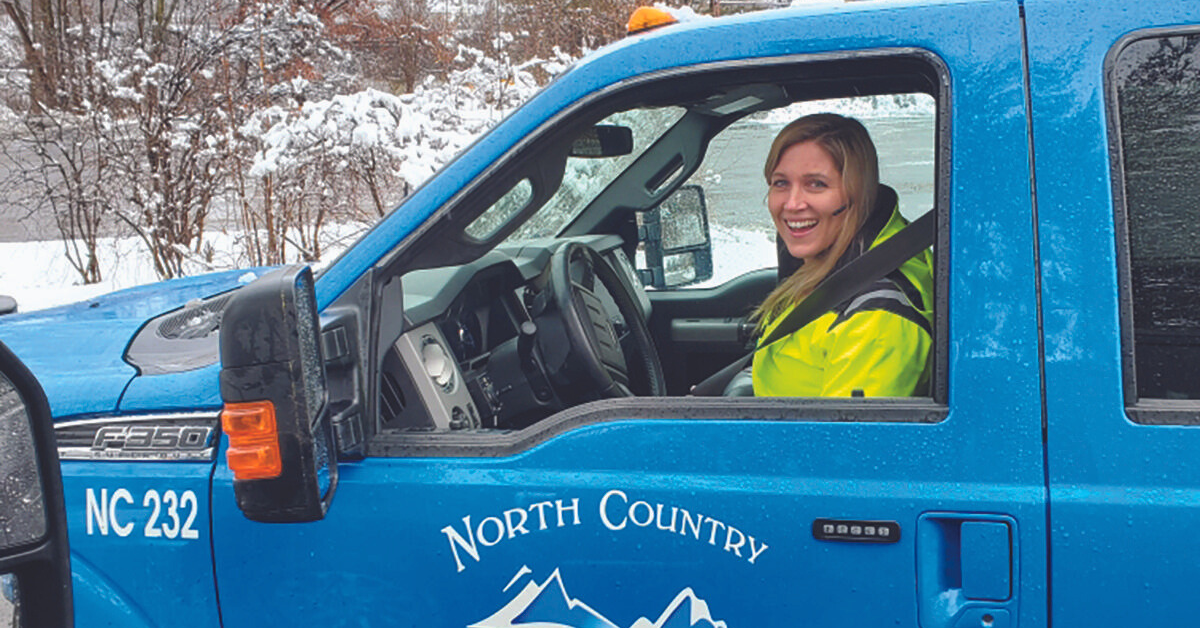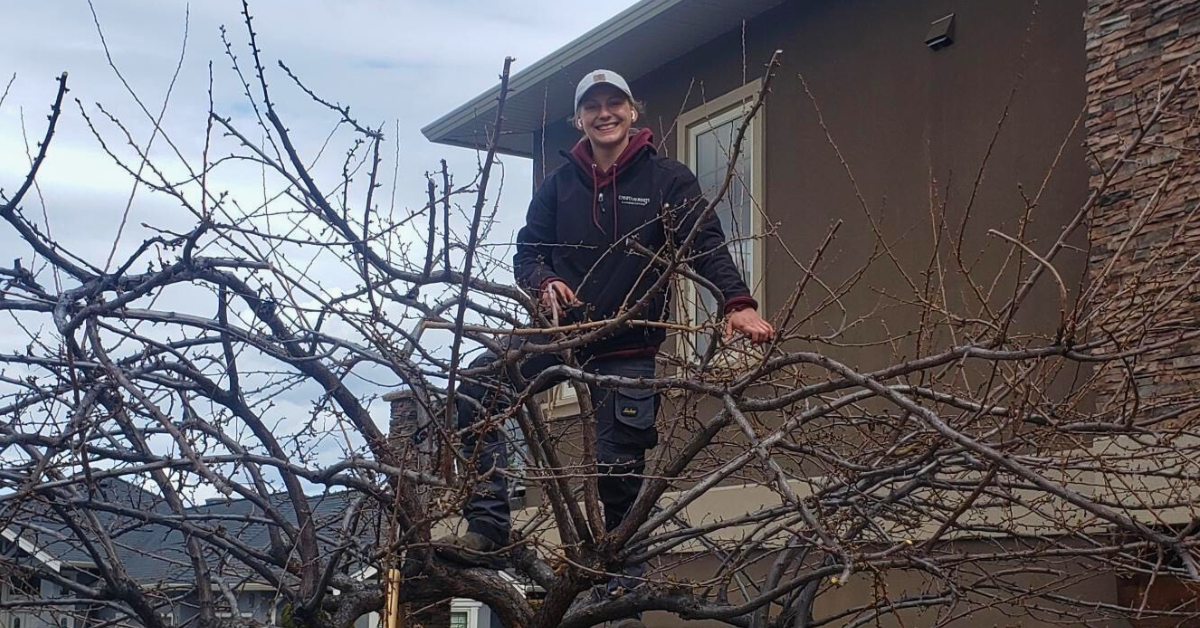August 5, 2024

Clearing the way
Three women on charting their own path in the snow and ice management industry.
BY KARINA SINCLAIR
While women are still underrepresented in the snow and ice sector, more and more are finding this non-traditional role to be fulfilling, flexible and even fun.
Just ask Michelle White, Nichole Ashton and Lexi Thompson. They'll tell you they love working in snow and ice removal. Whether they’re pushing a shovel or driving a plow, these women clean up like snowbody’s business.
In the winter of 2004, Michelle White joined the snow maintenance crew at Boot’s Landscaping in Richmond Hill, Ont. She cleared properties with a shovel and snow blower for five seasons before advancing to operating a tractor with a plow and drop salter for the past 15 years. Company owner Gerald Boot says White is one of his company’s best operators.
Nichole Ashton started her snow journey with a small landscape company out of Ayr, Ont., and worked her way up through various leadership roles, such as operations manager and training coordinator. Ashton is now the senior account manager at North Country Snow and Ice Management in Glen Falls, N.Y. She has also been on the board of directors for Smart About Salt for over a decade. Ashton doesn’t think it’s extraordinary for women to be in the industry at all, and has even brought her daughter along on some runs.
Like Ashton’s daughter, Lexi Thompson was also introduced to a career in snow management by her mother. With five seasons under her belt, Thompson’s career at Creative Roots Landscaping in Kelowna, B.C. is just getting started, but she looks forward to transitioning from hand shovelling to operating a plow. Her favourite part of snow removal is using the backpack blower to clear fine, lightweight snow because it feels like playing in the snow as a kid, while making the pathway safe to use.
Nichole Ashton
What drew you to work in the snow and ice management sector?
White: I always knew I wanted to get into the [landscaping] field because I loved gardening and being outdoors in general. So I took a college course, Environmental Landscape Management at Seneca's King City campus. I knew snow removal went hand in hand with landscaping, so when I graduated I stumbled upon an article in the Thornhill Liberal for Boot's Landscaping looking for shovelers and figured ‘let's give it a go.’ The rest is history.
Ashton: I was brought into the industry by a friend who owned a small town landscape company. It was just the two of us for a while, but we grew to about 12 team members. I eventually left to enhance my career at a larger local franchise, which opened my eyes to the corporate side of the industry. Eventually, we parted ways and the CEO of North Country Snow & Ice Management saw something in my skills and asked me to join his team. I have been here for almost eight years now and hopefully, forever. We have built a team of mostly women to manage the accounts and it's been very successful. I am very proud of my team, and I am thankful to North Country for the support and guidance to grow.
Thompson: I actually was doing snow removal before I started landscaping. I started snow removal when I was about 16. My mom had a snow route with Gable Landscaping and the boss was super nice, so I would tag along with my mom when I wasn't at school. And then when I started with Creative Roots Landscaping, it was kind of like, ‘Hey, I see you do snow removal. We're thinking of getting a crew going this year.’ And I was like, ‘Absolutely, I would totally be into that.’ Another reason I got into it was just to break up the winter and to make some money. In landscaping, we have three months off in the winter time, so it's really important for me to be able to get out and get some physical exercise. I miss working.
What are some of the biggest challenges you have faced working in this sector?
White: When I started, it wasn't common at all to see or hear of a woman doing snow removal, so there was a feeling that you had to prove yourself to the boys. Nowadays, it's quite common and, to be honest, I've seen way more men struggle with the physical labour than women. Either you have the endurance or you don't — the women do.
Ashton: Honestly, the only challenge I’ve found — which is no different than in any other career — is making sure I had proper daycare for the overnights and travel. I am a single mother and I have my child full time. Otherwise, as for most of the "stereotypes," I find that you get what you give. If you are kind and respectful, people will be kind and respectful back. I realized early on that if someone is disrespectful to me, they are likely disrespectful to everyone. I surrounded myself with mentors to make myself stronger and I've worked hard to help grow and strengthen all of my team members and vendors. If they are successful, then we are successful.
Thompson: There was a week this winter where I shovelled for six days straight and two of the days were 10-hour days. It can be very physical, and at the end of the week there was nowhere to pile the snow on our residential properties. You would have to throw it in the air just to get it out of the way. I'm not going to lie, the biggest challenge is when we have some very heavy and very cold days. It also sucks when you are covered in snow and then you get in a nice warm truck with the heat on, and suddenly you're wet. Then you get out at another property and then you freeze. There definitely are some downsides to the job, but you just dress warm and bring an extra pair of socks.
Lexi Thompson
Do you think men and women have different approaches to snow clearing?
White: I don't think there's a difference. Everyone is given the same basic training pre-season and it's more of an individual approach. Everyone has a different pace; some will put thought into the process and come up with ways to make the job easier on themselves and more productive overall.
Ashton: Yes, I think that women naturally pay more attention to detail, and from my experience, women have a softer approach with the equipment. Much less likely to ram the machines into snow piles or buildings. [I find] we ask more questions and listen better to instruction.
Thompson: Being a woman, you have to be a little bit more strategic with how you do things. Sometimes I think guys just go in there with brute force and just try to get the job done, whereas I have to try and create my route so I'm not shovelling a huge long strip of a driveway. Maybe instead of doing vertical passes, I'll do horizontal. Or one thing that worked really well for me was, on the heavy days, I would shovel everything to the side of the driveway and then get the snow blower and blow it all into the beds. It was kind of funny because my [male] partner started picking up on that too. Work smarter, not harder, right? It's about pacing yourself and being strategic, for sure.
How could the industry make these jobs more attractive to women?
White: I think the industry as a whole has become very aware of the strengths women have to offer. Nowadays, women know they can choose any job they please, so just seeing women out there in the field is more than enough to encourage them to feel comfortable about going for it.
Ashton: I think there is a history of negative stereotypes of women in male-dominated industries as a whole. Honestly, I think most women excel in the snow industry if they have a real passion for it. I have been working in this industry for my entire adult career, and I have found mentors and role models almost anywhere I go. This industry is full of the hardest working, most humble human beings that I have ever met. You don't just network in the industry, you learn, you grow and you build a family. I am truly honoured and grateful for all the relationships that I have built working in the winter maintenance industry. My advice to women: Ask, listen, learn. This industry, these people will make you a better human being.
Thompson: To attract more women, I think companies just need to advertise. And of course, [ensure] equal wages between men and women. It's important to even that out. And, you know, I'm all about women and women's strength but also being understanding that we are smaller than some of the men and we can't lift as much or go for as long. So having an opportunity for us to work at smaller properties or have a shorter run, and just finding that balance.

